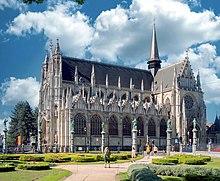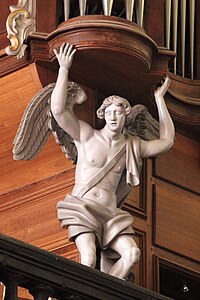Notre-Dame du Sablon / Onze-Lieve-Vrouw ten Zavel
The Notre-Dame du Sablon ( French ) or Onze-Lieve-Vrouw ten Zavel ( Dutch ) (sometimes also Notre-Dame des Victoires ) is a sacred building on Zavel / Sablon Square in Brussels .
The Gothic church has had a statue of the Madonna that gave it its name since the 14th century . In the 16th century the church was the burial place of the Habsburg postmasters, who ruled Thurn und Taxis at the end of the 17th century .
history
Today's Sablon / Zavel district in Brussels was nothing more than a large sandy area that served as a burial place in the 13th century. In 1304, the Crossbowmen's Guild built a chapel here. After a statue of the Virgin Mary, stolen from an Antwerp church and allegedly miraculous, was erected in the chapel in 1348 , it became a magnet for believers who made generous donations to the chapel.
This gave the crossbowmen's guild at the beginning of the 15th century the reason to replace the chapel with a new and larger sacred building. First the south transept and the first two pillars of the main nave were built, then the north transept and the choir followed , as well as the longitudinal aisles, which were extended again at the beginning of the 16th century. The massive retaining walls suggest that a tower was planned to be built. When unrest broke out after the death of Charles the Bold in 1477, construction work came to a standstill. Work on the side aisles and the main portal was only continued under the rule of Philip the Fair . The governor of the Habsburg Netherlands, Margaret of Austria , felt very close to the church and initiated a large procession there in 1530 in gratitude for the freedom from the plague that had struck Brussels.
When Calvinism arrived at the end of the 16th century , the church was closed, but also suffered little from the religious unrest thanks to the protection of the military guilds. During the French rule at the end of the 18th century, it was briefly de-dedicated and closed, but in 1803 it was reopened as a place of worship.
In the 19th century the church underwent a thorough renovation. First, the attached buildings were demolished in 1878, then the church building was restored successively by the architects Schoy, Jean Van Ysendyck and Maurice Van Ysendyck until the work could be completed in 1907 with the restoration of the south portal.
Pope Pius XI appointed Notre-Dame du Sablon on September 12, 1929 as the official church of the Belgian Lieutenancy of the Order of the Knights of the Holy Sepulcher in Jerusalem, founded in 1926 .
organ
The organ was built in 1764 by the organ builder Goynaut, and last worked on by the organ builder Westenfelder. The instrument has 41 stops on three manuals and a pedal . The playing and stop actions are mechanical.
|
|
|
|
||||||||||||||||||||||||||||||||||||||||||||||||||||||||||||||||||||||||||||||||||||||||||||||||||||||||||||||||||||||||||||||||||||||||||||||||
literature
- Jacques Mignon: Deux Eglises de Bruxelles: Notre-Dame du Sablon et Notre-Dame de la Chapelle . Fédération Touristique du Brabant, Brussels 1971.
- J. de Borchgrave d'Altena: Le mobilier et les écoinçons de l'église Notre-Dame du Sablon à Bruxelles . Bulletin de la Société Royale d'Archéologie de Bruxelles, 1935.
- Ms. Boelens-Sintsoff and A.-S. Walazyc (red.), De Onze-Lieve-Vrouw ten Zavelkerk , Brussels, Ministerie van het Brussels Hoofdstedelijk Gewest, 2004 (Collectie Geschiedenis & restauraties, 1).
Web links
Individual evidence
- ↑ La Lieutenance de Belgique , ordredusaintsepulcre.be, accessed on January 16, 2016 (French).
- ↑ Detailed information on the organ
Coordinates: 50 ° 50 ′ 25.5 ″ N , 4 ° 21 ′ 22.1 ″ E



